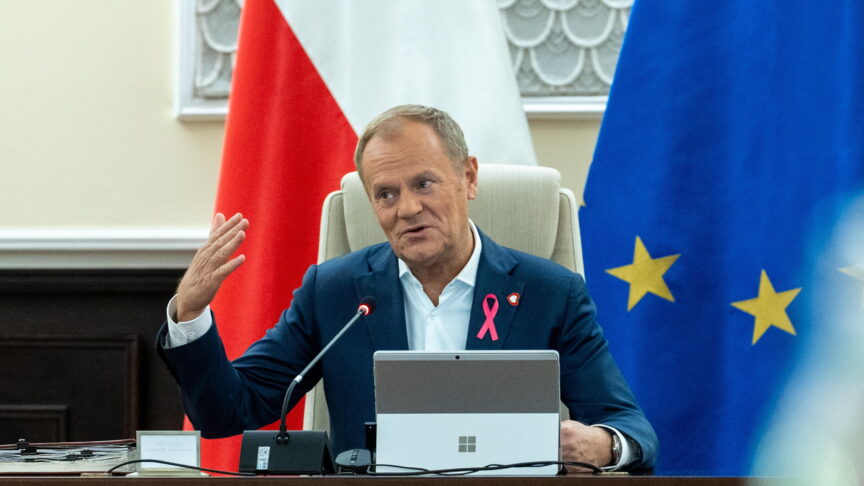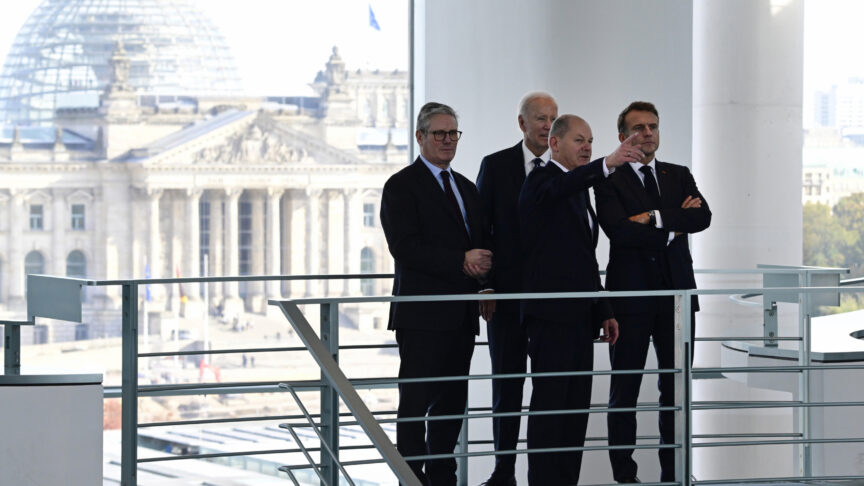Kosovo’s political impasse and the limits of EU’s ‘creative ambiguity’ approach
Kosovo is facing a major internal political stalemate for the second time in less than two years
Kosovo is facing a major internal political stalemate for the second time in less than two years. The political scene has been divided into two adverse camps and, most importantly, has brought institutional life to a practical standstill. The three-party opposition comprising the Self-Determination Movement (Vetëvendosje!), the Alliance for the Future of Kosovo (AAK), and the Initiative for Kosovo (Nisma), came together in August to oppose an agreement with Serbia on an “association” or “community” of Serb majority municipalities, and also to oppose an agreement with Montenegro on border demarcation. Considering these agreements to be detrimental to Kosovo, the opposition made it clear that it will use any means possible to force the government and prime minister to withdraw their signatures. Some of the tactics used so far have included pelting the prime minister and other ministers with eggs, using tear gas and obstructing the floor of the chamber.
The opposition has consistently rejected the pleas of the government and the international community to use dialogue and political means in its struggle. The critics of the agreement refuse to allow parliamentary proceedings even after the Constitutional Court announced this week that it has temporarily suspended the implementation of the agreement on the association until a final ruling has been made regarding its compliance with the Kosovan “constitutional spirit”. Indeed, the opposition refuses to be appeased by any decision of the Constitutional Court, considering it to be biased. The radical and uncompromising stance of the opposition leaves the government little room for manoeuvre, and heightens the risk of the conflict escalating.
Legitimate concerns or just a regular power-struggle?
The opposition’s stance is motivated by both power interests and legitimate concerns about the character of the agreements with Kosovo’s neighbouring states. Facing a government that has a strong majority and is often unaccountable, the opposition seems to consider radical action as the only strategy that might increase its chances of political success. Likewise, the uncompromising stance towards Prime Minister Isa Mustafa is partly motivated by the decision of the latter to form a coalition with the Democratic Party of Kosovo [PDK] last year – an action that was seen as a political betrayal by the opposition. The relations between the government and the opposition have seriously deteriorated into exchanges of derogatory language and reciprocal public accusations and insults.
In the past, the Self-Determination Movement were the group strongly opposed to engaging in any dialogue with Serbia (until it recognises Kosovo’s independence), organising protests and disrupting assembly meetings. Now, for the first time in Kosovo’s post-war parliamentary history, the opposition acts in unison. The most surprising thing about the current radicalism in Kosovo is the political U-turn made by the AAK and its leader Ramush Haradinaj – a former Kosovo Liberation Army commander and prime minister, indicted and acquitted (twice) by the International Criminal Tribunal for the former Yugoslavia (ICTY). Although in opposition, his party has been very supportive of the previous government and the process of dialogue with Serbia. However, once Haradinaj realised that this constrictive approach didn’t win him many votes in the last election, or help to gain stronger international support to achieve his long-standing ambitions of leading the government, he changed tactics. He has been particularly vocal in opposing the agreement on border demarcation with Montenegro on the grounds that it leaves out thousands of hectares. Yet, he might have a direct political interest here, because the area affected is where the bulk of his most loyal voters are concentrated.
On the other hand, the association is much more perplexing and sensitive. It was originally agreed by Kosovo and Serbia in 2013 under the First Agreement of Principles Governing the Normalisation of Relations, mediated by the EU. In August 2015 the two countries reached another agreement on the general principles and main elements of Serb municipalities in Kosovo, including its competences, structure, funding etc. A detailed statute is yet to be drafted.
Although little comprehensive debate on the document itself has taken place so far (the process of negotiations is completely opaque) the opposition has managed to outmanoeuvre the government in shaping opinion regarding the nature of this entity. Emphasising its mono-ethnic character and structure, its competences in economy, education, healthcare, urban planning, and direct ties with Serbia, the opposition has been warning the public about the spectre of “Republika Srpska” – the Serb Republic in Bosnia Herzegovina – rearing its head in Kosovo. Hence there are over 200,000 signatures against the association.
Although the text is very ambiguous and has yet to be developed into a detailed statute, certain elements of the agreement risk tipping the delicate balance between civic and multi-ethnic provisions laid down in the Ahtisaari Plan and Kosovan legislation. The current constitution provides for ethnically blind state institutions and predominant civic principles of equality regardless of belonging, on the one hand, and group-differentiated rights for non-dominant communities on the other, i.e. decentralisation of power, proportional representation, veto powers etc.
Importantly, this entity in the making derives from a legally dubious agreement with Serbia (which does not recognise Kosovo as a state), and mediated by the EU, which is based on the principle of “status neutrality”. So, a new (Serb) legal entity will be created within Kosovo, with Kosovan Serb leaders and Serbia itself standing firm by their decision not to recognise Kosovo’s statehood. The refusal to recognise Kosovo as well as the legal ambiguities within the agreements offer little hope for a smooth process of integration of Serbs within the Kosovan system. Quite the opposite. Bearing in mind the way it has been designed, we can expect the new entity to continue to be a major source of disagreement and contention between Kosovo and Serbia for years to come – hindering the integration of Kosovan Serbs and normalisation of relations between Kosovo and Serbia.
Ultimately, the current political crisis and debates around the issue of the Association point to a growing impatience in Kosovo with the whole process of dialogue with Serbia and the role of the EU. Frustration is growing over the slow pace of progress in the dialogue, the EU’s double standards, and Serbia’s destructive approach towards Kosovo’s statehood, which manifested most recently in inflammatory language against Kosovo’s bid to join UNESCO.
An end to the EU’s “creative ambiguity” approach?
Although the European Union has refused to get involved in the current political crisis in Kosovo, it is a key actor both in developments within Kosovo and relations with Serbia. Since 2008 the EU has assumed an increased and double-pronged role in Kosovo, both as a state-builder (through its EULEX Mission) and as an anchor of reforms through its policy of conditionality. Yet, being incapable of forming a shared vision and reaching an internal consensus on Kosovo’s statehood issue, the EU has been muddling through and improvising for many years. With the launch of the Brussels dialogue process in 2011, it practically tied Kosovo’s EU path to the normalisation of relations with Serbia. In both cases, the EU adopted a “status neutrality” approach, referred to as “creative ambiguity” by EU officials, that would allow it to keep a minimum internal consensus and engage Serbia.
In practice, this meant that in addition to the pace and scale of reforms, Kosovo’s EU progress would be conditioned by dissenting member states (Spain, Cyprus, Slovakia, Greece and Romania) and the dialogue with Serbia. In fact, more often than not, the EU evaluation of Kosovo’s institutions has been primarily motivated by political considerations, in particular its constructiveness in the dialogue with Serbia. This has enabled the Kosovan government to get away with its failure to undertake deeper reforms necessary for EU membership, which has contributed to an overall slowing of progress. Although this approach has enabled the EU to achieve significant results in the dialogue between Kosovo and Serbia (numerous agreements) and Kosovo’s EU integration process (the signing of a Stabilisation and Association Agreement (SAA) in October this year), it is fast approaching its limits.
In terms of the dialogue, despite the fact Serbia implicitly recognises the existence of a single legal order in Kosovo, it continues to challenge statehood both internally (by keeping its institutions active, claiming ownership of natural and economic assets) and externally (by blocking its membership in international institutions).
As regards the EU integration process, the signing of the SAA agreement is a major achievement for Kosovo and the EU. Yet, this, together with the visa liberalisation process, might be the last carrot the EU has to offer for a long time. The EU is not even close to solving its internal divisions regarding Kosovo’s status. It is clear that Kosovo can’t apply for EU membership before all its member states recognise it. While EU institutions speak loudly about their support of Kosovo’s progress and integration, some of its member states actively oppose its independence and international integration (most recently Spain, Cyprus, and Slovakia voted against Kosovo’s UNESCO membership, whereas Greece, Romania and Poland abstained). Undoubtedly, this risks breaking the once-solid political consensus and popular support over EU integration. The boycott by oppositional parties of the ratification of the SAA with the EU recently is a small but significant step in that direction.
As the EU’s “creative ambiguity” is reaching its limits, it is time for it to come up with a fresh and bolder approach in order to overcome the political impasse in Kosovo. As an essential actor for both countries, the EU holds the key to the normalisation of relations between Kosovo and Serbia and integration of the region with Europe.
Regardless of the outcome of the internal political crisis in Kosovo, it is highly unlikely that political relations in Kosovo and between Kosovo, Serbia and the EU will be the same.
Gëzim Krasniqi is the Alexander Nash Fellow in Albanian Studies at the School of Slavonic and East European Studies, University College London (UCL).
The European Council on Foreign Relations does not take collective positions. ECFR publications only represent the views of their individual authors.


